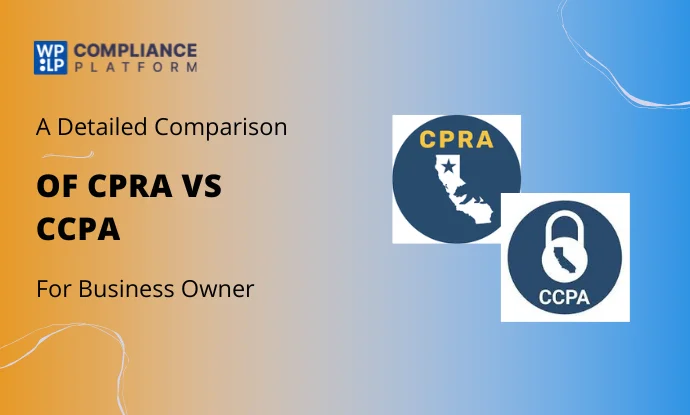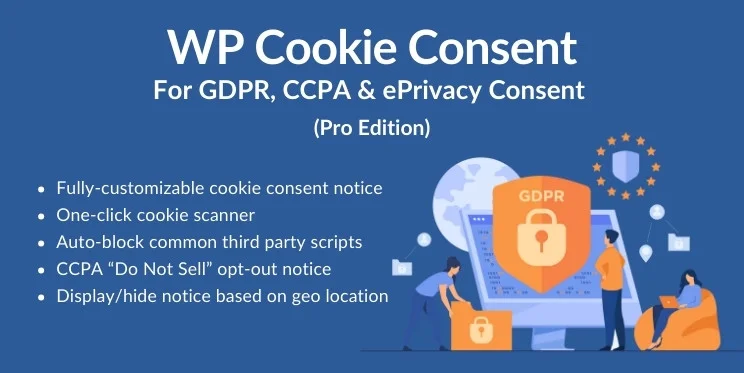CPRA vs CCPA – A Detailed Comparison For 2025

Summary
Our article covers key changes, including the new enforcement agency, CPPA. It also explains expanded consumer rights and increased business obligations.
Learn how the CPRA improves privacy protections for California residents.
Are you looking to know the differences between CPRA vs CCPA?
With frequent data breaches, international data privacy rules and regulations are important for protecting people’s rights in the digital age.
The California Consumer Privacy Act (CCPA) and the California Privacy Rights Act (CPRA) are the two most significant data privacy regulations in the United States.
California privacy laws regulate how businesses gather, use, and disclose personal information to prevent it from falling into the wrong hands.
Here, the comparison between the CCPA and CPRA allows us to examine the operation of these two regulatory statutes and the rights they grant to individuals.
What is CPRA?
The California Privacy Rights Act (CPRA), a California-specific law, expands and enhances the California Consumer Privacy Act (CCPA). With the CPRA, new rights are granted to Californians, and new enforcement authority is granted to the California Attorney General.
The CPRA, sometimes called CCPA 2.0 or Proposition 24, is a ballot initiative placed on the general election ballot on November 3, 2020, supported by most California voters.
Similar to the CCPA privacy rulemaking, the CPRA is predicated on the opt-out cookie consent framework, which states that as long as data subjects are offered the option to opt-out, using cookies does not require their approval.
In response to complaints that the CCPA did not sufficiently safeguard the privacy rights of data subjects, the CPRA was passed. The CPRA introduces new provisions and modifies several CCPA sections, including:
- Establishing a right to know what personal data is being gathered.
- Granting you the option, rather than the requirement, to opt out of having your personal information sold.
- Granting you the ability to ask for the deletion of your personal data
- Prohibiting companies from treating you unfairly if you use your right to privacy
- Establishing the California Privacy Protection Agency (CPPA), a new enforcement organization with more authority to uphold the law
What is CCPA?
A data privacy regulation known as the California Consumer Privacy Act (CCPA) applies to companies that gather, use, or sell personal consumer information from California residents.
Businesses are required by law to declare the types of personal information they gather, why they get it, and who they share it with.
Additionally, companies must offer customers the choice not to sell their personal information. The (California Consumer Privacy Act) CCPA compliance became operative on January 1, 2020. It is the equivalent of the General Data Protection Regulation (GDPR) in the European Union.
Under both laws, customers have the right to know what personal information is collected about them and the option to refuse to have their personal information sold. Still, there are some key differences between the two data privacy regulations.
Any company, regardless of location, that handles or gathers personal data from EU citizens is subject to the GDPR. Only companies that meet one or more of the following requirements and have their headquarters or conduct business in California are subject to the CCPA. Here are the requirements:
- Has an annual gross income of over $25 million.
- Collects, sells, or distributes personal data from at least 50,000 customers, households, or devices for profit.
- Makes at least 50% of its annual revenue from selling customer personal data.
Did CPRA Replace the CCPA?
No, the CPRA did not replace the CCPA. Instead, it amended certain parts of the CCPA. Any unchanged parts still apply to businesses and consumers.
Because of this, organizations like the CPPA, which is responsible for enforcing the CPRA, refer to the laws as the CCPA, the amended CCPA, or the CCPA regulations.
What Are The Similarities Between CCPA and CPRA?
The CPRA and the CCPA are data privacy regulations governing how companies handle Californians’ personal information. Many things about them are similar. Here are the similarities:
- Californians have the right to know what personal data is being collected, for what purpose, and how it will be used.
- Californians have the right to request the deletion of their personal information under both statutes.
- By abiding by these regulations, individuals in California can opt out of having their personal information sold to external parties.
- Businesses must have a prominent and obvious link on their homepage that says “Do Not Sell My Personal Information.
How Does CPRA vs CCPA Differ From Each Other?
In this section, let us talk about the key difference between CPRA vs CCPA in detail.
The California Consumer Privacy Act (CCPA) and the California Privacy Rights Act (CPRA) are both privacy laws that aim to protect the personal data of California residents. Still, there are some key differences between the two:
1. Scope: The CPRA expands on the protections provided by the CCPA by introducing new privacy rights and obligations. It also establishes the California Privacy Protection Agency to enforce and implement the CPRA.
2. Sensitive Personal Information: The CPRA introduces the concept of “sensitive personal information,” which includes data such as social security numbers, driver’s license numbers, account credentials, precise geolocation, race, religion, and more. This category of data is subject to additional protections under the CPRA.
3. Data Minimization: The CPRA requires businesses to limit the collection, use, retention, and sharing of personal information to what is reasonably necessary to achieve the purposes for which the data was collected.
4. Contractual Obligations: The CPRA imposes contractual obligations on businesses that share personal information with third parties, requiring them to include specific provisions in contracts related to data processing and protection.
5. Additional Rights: The CPRA expands on the rights provided by the CCPA, including the right to correct inaccurate personal information, the right to limit the use and disclosure of sensitive personal information, and the right to opt out of the sharing of personal information for behavioral advertising.
Overall, the CPRA builds upon the foundation laid by the CCPA to provide stronger privacy protection for California residents and places additional obligations on businesses that handle personal information.
CCPA vs CPRA Compliance: Who Needs To Comply With Law
The CPRA changes some important CCPA thresholds but keeps most of them unchanged.
CCPA
- Has more than $25 million in gross income annually.
- Purchases, gets, sells, or exchanges the personal data of at least 50,000 people, households, or devices for a profit.
- Receives at least half of its yearly income from the sale of personal data by consumers.
CPRA
- Has more than $25 million in total income annually from the previous calendar year.
- Purchases, sells, or exchanges at least 100,000 customers’ or households’ personal information.
- Receives at least half of its yearly income from selling or exchanging personal consumer data.
Before the CPRA’s passage, businesses could use any existing branding, even if they shared California consumers’ personal information. With the CPRA, relevant businesses will now be subject to new and existing legislation.
How to Comply With CCPA and CPRA?
In this review comparison article of CPRA vs CCPA, you should take the following actions to make sure your company complies with the CPRA and the CCPA:
- Include a CCPA-compliant privacy statement on your website.
- Additionally, your website should include a clear cookie policy explaining how trackers gather, save, and utilize personal data.
- Include a link in your website’s footer that says, “Do Not Sell or Share My Personal Information.”
- Include a link in your website’s footer that says, “Limit the Use of My Personal Information.”
- Alternatively, respect the opt-out preference settings that users put on their browsers in place of links.
- Put in place appropriate security measures to prevent hacking or breaches of sensitive consumer data.
- Post a Data Request form on your website to facilitate user queries. Include a notification of consumer rights in a section of your compliance privacy policy.
- Keep customer personal information just as long as it is legitimately required.
Although the checklist may seem lengthy, compliance doesn’t have to be difficult, especially with the correct assistance.
In the following section, let’s clarify how to simplify data privacy compliance.
How WP Cookie Consent Can Help

Although complying with the CCPA and CPRA changes may seem challenging, we can help ease you of those responsibilities by offering a Consent Management Platform that can help you with privacy protection and comply with both laws.
WP Cookie Consent, a cookie consent management application for WordPress websites, can be used to create a cookie consent banner. This useful WordPress plugin was developed to help websites comply with GPC regulations by displaying legitimate cookie consent banners.
It offers a user-friendly interface and plenty of functionalities. This plugin’s ability to recognize users’ browsers’ “Do Not Track” settings is one of its premium features; it helps to respect users’ privacy preferences.
Using the WP cookie consent plugin, you can fulfill users’ privacy wishes by enabling your website’s “Do not track” or Global Privacy option.
CPRA vs CCPA FAQ
CCPA stands for California Consumer Privacy Act, which applies to businesses operating in California. CPPA, on the other hand, stands for California Privacy Rights Act, which is similar to CCPA.
CCPA and CPRA are consumer privacy laws but have some key differences. CCPA (California Consumer Privacy Act) applies to businesses operating in California, while CPRA (California Privacy Rights Act) applies to all businesses operating in the states.
Yes, the California Consumer Privacy Act (CCPA) and the California Privacy Rights Act (CPRA) are related, but the CPRA builds upon the CCPA’s foundation.
Conclusion
In this CPRA vs CCPA review, we have tried to cover every point the law covers. Two crucial pieces of legislation that will significantly impact how businesses function are the CCPA and CPRA. You must know the distinctions between the two to comply with both.
Businesses that gather and sell Californians’ personal information are subject to the CCPA. On the other hand, companies that use Californians’ personal information for purposes like targeted advertising are subject to the CPRA restrictions.
Even though the two laws share many similarities, it’s crucial to comprehend their main distinctions to ensure your company complies with the CCPA and the CPRA.
The two laws are essentially similar but offer two different legal frameworks for data privacy. To adhere to these rules, we advise using the WP Cookie Consent plugin for CPRA and CCPA compliance.
If you’ve liked reading this article, don’t forget to check out our other engaging articles:
- Cookieless Future: Everything You’ll Need To Know
- American Data Privacy and Protection Act (ADPPA)
- How To Add Cookie Banner To Your eCommerce Website
Want to create a unique cookie consent banner for your WordPress website, grab the WP Cookie Consent plugin!
